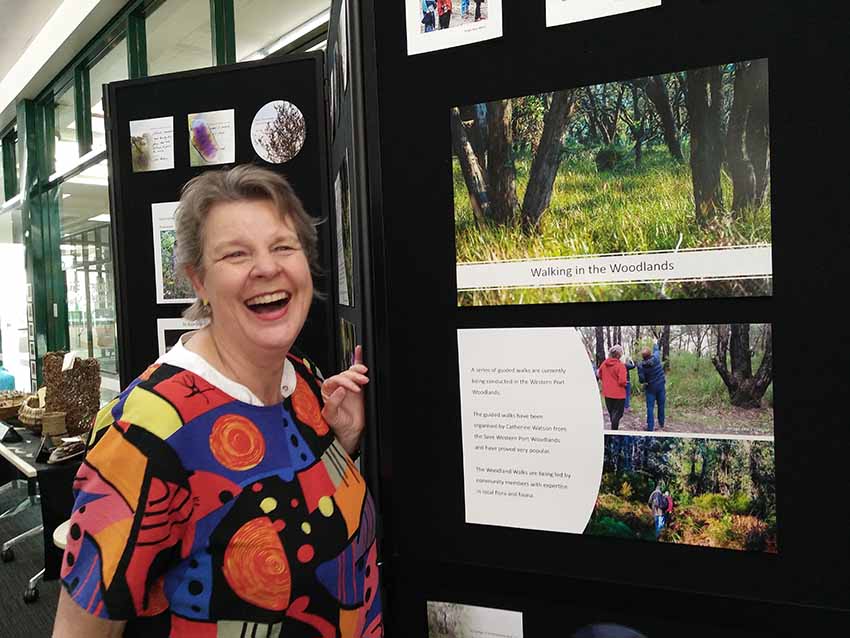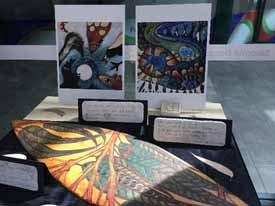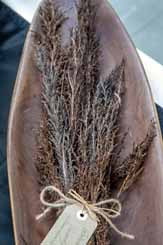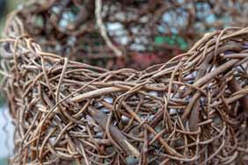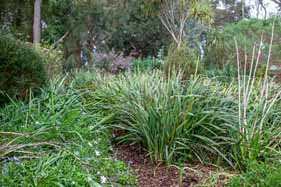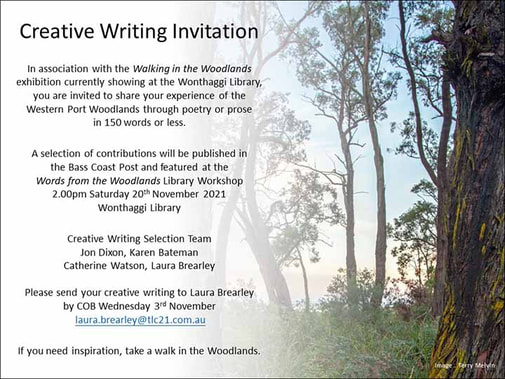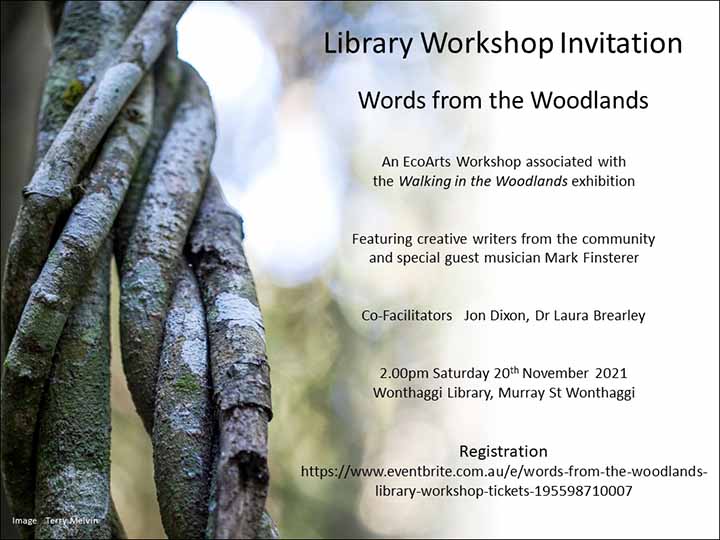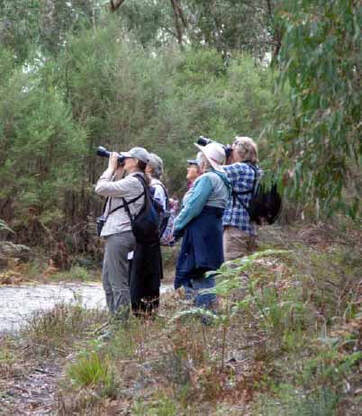 Walking in the Adams Creek Nature Conservation Reserve with Jackie and Dave Newman, our guides. Photo: Terry Melvin
Walking in the Adams Creek Nature Conservation Reserve with Jackie and Dave Newman, our guides. Photo: Terry Melvin By Laura Brearley
AS A community, we’ve been doing a lot of walking in the Western Port Woodlands lately. We’ve been in good company and have been guided by experts in birds, trees, flowers and fungi. Catherine Watson from Save Western Port Woodlands has been organising the walks and inviting us into new ways of experiencing and appreciating the Woodlands. The walks are a sensory delight and have deepened our sense of connection with each other and the more than human world.
In the last issue of the Bass Coast Post, Linda Cuttriss gifted us with an evocative description of her experience of taking part in these walks. In Of Magic, Mystery and Monsters, she seamlessly wove together stories, information and personal reflections into a lyrical form of ecological advocacy.
AS A community, we’ve been doing a lot of walking in the Western Port Woodlands lately. We’ve been in good company and have been guided by experts in birds, trees, flowers and fungi. Catherine Watson from Save Western Port Woodlands has been organising the walks and inviting us into new ways of experiencing and appreciating the Woodlands. The walks are a sensory delight and have deepened our sense of connection with each other and the more than human world.
In the last issue of the Bass Coast Post, Linda Cuttriss gifted us with an evocative description of her experience of taking part in these walks. In Of Magic, Mystery and Monsters, she seamlessly wove together stories, information and personal reflections into a lyrical form of ecological advocacy.
The Walking in the Woodlands exhibition, currently on display at the Wonthaggi Library, is another form of interwoven creative expression that reveals our relationship with the living world. Here’s a photostory of Walking in the Woodlands.
| The exhibition includes the words of nature-lovers and poets from the community and beyond. It features artworks and words of wisdom from First Nation artists, Mick Harding (Taungwurrung), Lisa Kennedy (Pairrebeene/Trawlwoolway) and Ron Murray (Wamba Wamba). Mick Harding’s powerful wood-burned shield, two of Lisa Kennedy’s artworks and a coolamon by Ron Murray are also part of the exhibition. Here are some of Ron Murray’s words from the exhibition: ‘We’ve got to listen To the wind in the trees Listen to the birds It’s the feeling of a gift A gift always comes back.’ |
At the exhibition, you can also see some of Liz McDonald’s exquisite baskets, handwoven from Indigenous grasses grown in her garden in the Gurdies.
Creative Invitation
We’d like to broaden out this exploration of the Western Port Woodlands and extend a creative invitation to you to share your experience of the Woodlands through poetry or prose. As we did in the Coastal Connections project, we’ll ask you to contain your responses to 150 words or less.
Contributions will be published in the Bass Coast Post. If you’d like to write something about your experience of Woodlands, please email it to Laura Brearley by COB Wednesday 3rd November.
We’d like to broaden out this exploration of the Western Port Woodlands and extend a creative invitation to you to share your experience of the Woodlands through poetry or prose. As we did in the Coastal Connections project, we’ll ask you to contain your responses to 150 words or less.
Contributions will be published in the Bass Coast Post. If you’d like to write something about your experience of Woodlands, please email it to Laura Brearley by COB Wednesday 3rd November.
So … what can you possibly do in 150 words? It’s a challenge for sure, but 150 words can go a long way. Remember Catherine Watson’s poem ‘Bernadette’s Beach’ in the Coastal Connections project?
And remember how good they sounded with Mark Finsterer’s improvisation at the Coastal Connections Concert earlier this year? You can experience it again at the 13-minute mark of the film of the concert at https://www.youtube.com/watch?v=JVC2h6R3c1k&t=773s
Here are some more examples of what can be done in 150 words or less. The Wonthaggi Library exhibition features words written by community members after walking in the Woodlands. Here’s a distillation I’ve made of exactly 150 words from some of the community’s responses.
Highlights of walking in the woodlands
The sea of wattles
The moss and delicate flowers
The Rufus Whistler and White-throated Treecreeper
Seeing a Wedge Tailed Eagle swoop low through the trees
Simply walking in the bush
Walking in woods with people who know and care
Three words that distil the experience
Peaceful, protective, connected
Relaxed, calm, invigorated
Renewed, delighted, amazed
Serene, contented, delighted
Happy, content, joyful
Refreshed, amazed and inspired
More aware, excited
Walking in the woodlands has revealed
Bountiful flora
The large number of birds
A local treasure
Scars in the earth
Healing of past quarries
How lucky we are nature abounds
How the world was - how the world should be
Messages to the woodlands
Blessings upon you
Stay strong, stand tall, stay safe
I hope my grandchildren can experience you
Thank you for providing the air we breathe
Hang in there
Hold on
We are with you
Big thanks to the community for sharing such eloquent and heartfelt words.
A lot can be said in even less than 150 words. Here are 111 words about trees from Pulitzer Prize winning author Richard Powers, from his 2020 book ‘The Overstory’.
‘We found that trees could communicate, over the air and through their roots. Common sense hooted us down. We found that trees take care of each other. That a tree learns to save water. That trees feed their young and synchronize their masts and bank resources and warn kin and send out signals to wasps to come and save them from attacks … A forest knows things. They wire themselves up underground. There are brains down there, ones our own brains aren’t shaped to see. Root plasticity, solving problems and making decisions. Fungal synapses. What else do you want to call it? Link enough trees together, and a forest grows aware.”
And here are 143 words about community, knowledge and place from writer, activist and farmer Wendell Berry. They are an excerpt from his work, ‘A Poem in Hope’.
“Belong to your place by knowledge of the others who are
Your neighbors in it …
This knowledge cannot be taken from you by power
Or by wealth …
Answer with knowledge of the others who are here
And how to be here with them. By this knowledge
Make the sense you need to make. By it stand
In the dignity of good sense, whatever may follow.
Speak to your fellow humans as your place
Has taught you to speak, as it has spoken to you.
Listen privately, silently to the voices that rise up
From the pages of books and from your own heart.
Be still and listen to the voices that belong
To the streambanks and the trees and the open fields.
There are songs and sayings that belong to this place,
By which it speaks for itself and no other”.
And on the idea of ‘And yet’ (which some say are the two most powerful words in the English language), we have 146 words from nature poet Mary Oliver. The first excerpt is from ‘Swan: Poems and Prose Poems’ and the second from ‘Long Life: Essays and Other Writings’.
“If you suddenly and unexpectedly feel joy, don’t hesitate. Give in to it. There are plenty of lives and whole towns destroyed or about to be. We are not wise, and not very often kind. And much can never be redeemed. Still life has some possibility left. Perhaps this is its way of fighting back, that sometimes something happened better than all the riches or power in the world. It could be anything, but very likely you notice it in the instant when love begins … Anyway, whatever it is, don’t be afraid of its plenty. Joy is not made to be a crumb.”
“The world, moist and beautiful, calls to each of us to make a new and serious response. That's the big question, the one the world throws at you every morning.
‘Here you are, alive. Would you like to make a comment?’ “
With your permission, we would like to share some of your responses at a Creative Writing Workshop, Words from the Woodlands, being held in association with the Walking in the Woodlands exhibition. The workshop is being held at the Wonthaggi Library on Saturday 20th November, at 2.00pm. Special guest musician, Mark Finsterer, will improvise to a selection of the contributions. I’ll be co-facilitating the workshop with poet, published author and manager of the Wonthaggi Library, Jon Dixon.
And remember how good they sounded with Mark Finsterer’s improvisation at the Coastal Connections Concert earlier this year? You can experience it again at the 13-minute mark of the film of the concert at https://www.youtube.com/watch?v=JVC2h6R3c1k&t=773s
Here are some more examples of what can be done in 150 words or less. The Wonthaggi Library exhibition features words written by community members after walking in the Woodlands. Here’s a distillation I’ve made of exactly 150 words from some of the community’s responses.
Highlights of walking in the woodlands
The sea of wattles
The moss and delicate flowers
The Rufus Whistler and White-throated Treecreeper
Seeing a Wedge Tailed Eagle swoop low through the trees
Simply walking in the bush
Walking in woods with people who know and care
Three words that distil the experience
Peaceful, protective, connected
Relaxed, calm, invigorated
Renewed, delighted, amazed
Serene, contented, delighted
Happy, content, joyful
Refreshed, amazed and inspired
More aware, excited
Walking in the woodlands has revealed
Bountiful flora
The large number of birds
A local treasure
Scars in the earth
Healing of past quarries
How lucky we are nature abounds
How the world was - how the world should be
Messages to the woodlands
Blessings upon you
Stay strong, stand tall, stay safe
I hope my grandchildren can experience you
Thank you for providing the air we breathe
Hang in there
Hold on
We are with you
Big thanks to the community for sharing such eloquent and heartfelt words.
A lot can be said in even less than 150 words. Here are 111 words about trees from Pulitzer Prize winning author Richard Powers, from his 2020 book ‘The Overstory’.
‘We found that trees could communicate, over the air and through their roots. Common sense hooted us down. We found that trees take care of each other. That a tree learns to save water. That trees feed their young and synchronize their masts and bank resources and warn kin and send out signals to wasps to come and save them from attacks … A forest knows things. They wire themselves up underground. There are brains down there, ones our own brains aren’t shaped to see. Root plasticity, solving problems and making decisions. Fungal synapses. What else do you want to call it? Link enough trees together, and a forest grows aware.”
And here are 143 words about community, knowledge and place from writer, activist and farmer Wendell Berry. They are an excerpt from his work, ‘A Poem in Hope’.
“Belong to your place by knowledge of the others who are
Your neighbors in it …
This knowledge cannot be taken from you by power
Or by wealth …
Answer with knowledge of the others who are here
And how to be here with them. By this knowledge
Make the sense you need to make. By it stand
In the dignity of good sense, whatever may follow.
Speak to your fellow humans as your place
Has taught you to speak, as it has spoken to you.
Listen privately, silently to the voices that rise up
From the pages of books and from your own heart.
Be still and listen to the voices that belong
To the streambanks and the trees and the open fields.
There are songs and sayings that belong to this place,
By which it speaks for itself and no other”.
And on the idea of ‘And yet’ (which some say are the two most powerful words in the English language), we have 146 words from nature poet Mary Oliver. The first excerpt is from ‘Swan: Poems and Prose Poems’ and the second from ‘Long Life: Essays and Other Writings’.
“If you suddenly and unexpectedly feel joy, don’t hesitate. Give in to it. There are plenty of lives and whole towns destroyed or about to be. We are not wise, and not very often kind. And much can never be redeemed. Still life has some possibility left. Perhaps this is its way of fighting back, that sometimes something happened better than all the riches or power in the world. It could be anything, but very likely you notice it in the instant when love begins … Anyway, whatever it is, don’t be afraid of its plenty. Joy is not made to be a crumb.”
“The world, moist and beautiful, calls to each of us to make a new and serious response. That's the big question, the one the world throws at you every morning.
‘Here you are, alive. Would you like to make a comment?’ “
With your permission, we would like to share some of your responses at a Creative Writing Workshop, Words from the Woodlands, being held in association with the Walking in the Woodlands exhibition. The workshop is being held at the Wonthaggi Library on Saturday 20th November, at 2.00pm. Special guest musician, Mark Finsterer, will improvise to a selection of the contributions. I’ll be co-facilitating the workshop with poet, published author and manager of the Wonthaggi Library, Jon Dixon.
So there you have it. The invitation is there.
And here we are, alive.
Would you like to make a comment?
And here we are, alive.
Would you like to make a comment?
